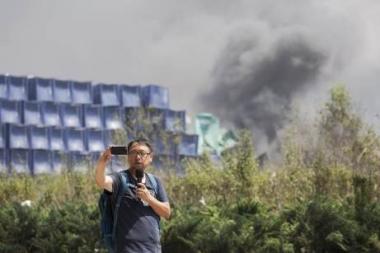The Summer School is organised by the Centre for Media Pluralism and Media Freedom (CMPF) at the Robert Schuman Centre for Advanced Studies of the
Tomorrow's News

Digital media has revolutionised news. But many news organisations - whether in developing or developed countries - are still grappling with what it will mean to them, and how to get the most out of it.
If this sounds familiar, then the Thomson Reuters Foundation's brand new programme Tomorrow's News has been designed for you.
Tomorrow's News is a programme for media outlets in developing countries or countries in political transition that are committed to high quality journalism, and that want to produce strong digital content that increases their reach and impact - but which are uncertain what kind of content will work best, and how to produce it on a tight budget.
The programme will draw on the latest knowledge on media trends from the Reuters Institute for the Study of Journalism, together with media skills from Thomson Reuters and media innovations from across the world, to offer guidance on:
Finding out what audiences want and building a strategy around this
Producing appropriate digital content using a range of technologies, including smart phones
Packaging and distributing content as effectively as possible
Tomorrow's News will be tailored to the needs and contexts of the outlets with which it works. The programme does not claim to have all the answers - and it does not suggest that the best guidance comes from western media. The challenges faced by media in low- and middle-income countries are many, varied, and frequently distinct from those that face media elsewhere.
Instead, Tomorrow's News will share best practice and innovations, and seek to build a community of media outlets from across the world that want to go cross platform and make it count.
We would like to hear from news professionals who represent their media outlet and who can influence their colleagues. These individuals will become the key contact point for their news organisation.
The programme will then offer:
Intensive workshops on strategising and producing cross platform content (taking place in different locations in June/July 2016)
In-house trainings or consultancies tailor made for newsrooms, plus ongoing guidance and support where needed
Opportunities to take part in other training events and seminars, addressing key areas identified by participating newsrooms themselves
Updates on the latest knowledge on media trends and convergence
The programme will provide experts from both developing and developed countries to deliver workshops and consultancies. We aim to ensure everything we deliver is relevant to the news outlets taking part.
Individuals may apply for Tomorrow's News on behalf of their news organisation.
You might be an editor, senior journalist, head of training, or a different role - but whatever the case, you must have influence in your news organisation and the ability to share knowledge and change practice among colleagues.
If you are not in charge of the newsroom yourself, please supply a letter signed by the person who makes decisions about overall newsroom policy - such as the editor, managing editor, or equivalent - consenting to your participation.
Criteria for news organisations:
Must be producing independent journalism
Must be based in a developing country or country in political transition
Can be working in any medium - print, radio, TV, online, or a combination of these. (News outlets which primarily exist online are welcome to apply; they will be able to explore how they use that space, and even consider whether non-digital media could be of use)
Can be large, small or anywhere in between
A news outlet's coverage may focus on one specific area (such as business or politics) or may have a general news focus





